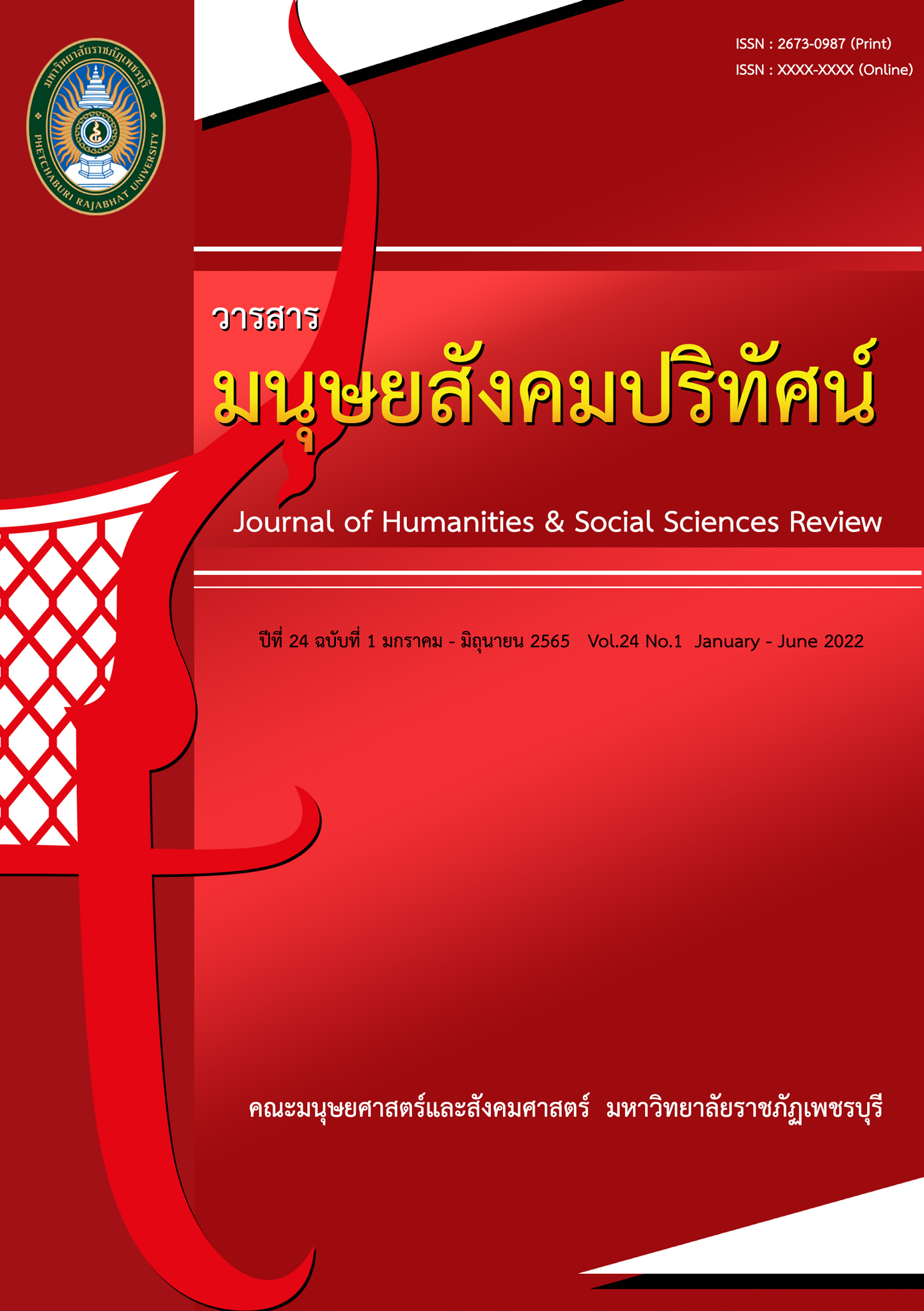The Development of The King Rama IX’s Wisdom Instructional’ Social Studies Model for Sufficiency Economy as Life Philosophy
Main Article Content
Abstract
The purposes of this research were: 1) to develop the King Rama IX’s wisdom instructional’ social studies model for sufficiency economy as life philosophy 2) to study the effectiveness of the development of the King Rama IX’s wisdom instructional’ social studies model for sufficiency economy as life as follow; 2.1) to compare Sufficiency Economy as life philosophy of students between before and after learning 2.2) to study the satisfaction of students toward the King Rama IX’s wisdom instructional’ social studies model and 2.3) to study the satisfaction of teacher toward the King Rama IX’s wisdom instructional’ social studies model. The purposive sampling was used to select the samplings from the students in early childhood, primary and secondary at Suwan Rangsarit Witthaya School and graduate level at Phetchaburi Rajabhat University. The results of the research were: the academic achievement of students after learning from the King Rama IX’s wisdom instructional’ social studies model was higher than before the treatment, satisfaction of students towards the King Rama IX’s wisdom instructional’ social studies model was at a high level and teachers can clearly reflect the teaching results by using the development of the King Rama IX’s wisdom instructional’ social studies model for sufficiency economy as life philosophy
Article Details
1. Any views and comments in the article are the authors’ views. The editorial board has not to agree with those views and it is not considered as the editorial board’s responsibility. In case, there is any lawsuit about copyright infringement, it is considered as the authors’ sole responsibility.
2. The article copyright belonging to Faculty of Humanities and Social Sciences, Phetchaburi Rajabhat University are copyrighted legally. Republication must be received direct permission from the authors and Phetchaburi Rajabhat University in written form.
References
กระทรวงศึกษาธิการ. (2551). หลักสูตรแกนกลางการศึกษาขั้นพื้นฐานพุทธศักราช 2551.
กรุงเทพฯ: กระทรวงศึกษาธิการ.
เกษม วัฒนชัย. (2550). เศรษฐกิจพอเพียงตามแนวพระราชดำริ. วารสารผู้ตรวจการแผ่นดินของรัฐสภา, 5(2), 155-156.
เกษม วัฒนชัย. (2558). ปรัชญาของเศรษฐกิจพอเพียงกับความเข้มแข็งของโรงเรียน. กรุงเทพฯ: ธนิธการพิมพ์.
คณะอนุกรรรมการศึกษาปรัชญาทฤษฎีแห่งศาสตร์พระราชา. (2560). ศาสตร์พระราชา. กรุงเทพฯ: สำนักงานคณะกรรมการพัฒนาการเศรษฐกิจและสังคมแห่งชาติ.
ทิศนา แขมมณี. (2545). ศาสตร์การสอน. กรงเทพฯ: สํานักพิมพ์แห่งจุฬาลงกรณ์มหาวิทยาลัย.
พรสันต์ เลิศวิทยาวิวัฒน์. (2550). รูปแบบการพัฒนาคุณลักษณะนิสัยที่พึงประสงค์ของนักเรียนอาชีวศึกษาเอกชน. วิทยานิพนธ์ปริญญาการศึกษาดุษฎีบัณฑิต สาขาบริหารการศึกษา บัณฑิตวิทยาลัย มหาวิทยาลัยบูรพา.
พระราชบัญญัติมหาวิทยาลัยราชภัฏ พ.ศ. 2547. ราชกิจจานุเบกษา เล่มที่ 121 ตอนที่ 1. ใส่รายละเอียดให้
ไพฑูรย์ สินลารัตน์. (2554). หลักและเทคนิคการสอนระดับดุมศึกษา. กรุงเทพฯ: มหาวิทยาลัยธุรกิจบัณฑิตย์.
มนัส สุวรรณ. (2560). เศรษฐกิจพอเพียง: พระอัจฉริยภาพทางมนุษยนิเวศวิทยาแห่งองค์พระบาทสมเด็จ
พระเจ้าอยู่หัว. สืบค้นเมื่อ 20 มกราคม 2564, จากhttp://www.cmruir.cmru.ac.th/handle/123456789/1129.
ยุทธศาสตร์มหาวิทยาลัยราชภัฏเพชรบุรี ระยะ 5 ปี 2560-2564. สืบค้นเมื่อ 20 มกราคม 2564, จากhttp://plan.pbru.ac.th/ejournal/PBRU20year_Strategy.pdf.
วิจารณ์ พานิช. (2555). วิถีสร้างการเรียนรู้เพื่อศิษย์ในศตวรรษที่ 21. กรุงเทพฯ: มูลนิธิสดศรีสฤษดิ์วงศ์.
วิชัย ตันศิริ (2536). เครือข่ายการเรียนรู้กับการศึกษาตลอดชีวิต. กรุงเทพฯ: การศึกษาแห่งชาติ.
วิชัย วงษ์ใหญ่. (2554). นวัตกรรมหลักสูตรและการเรียนรู้สู่ความเป็นพลเมืองดี. กรุงเทพฯ: อาร์แอนด์ปริ๊นต์.
วิษณุ เครืองาม. (2560). ศาสตร์พระราชา ศาสตร์แห่งแผ่นดิน. ปาฐกถาพิเศษ ณ ห้องประชาธิปก สถาบันพระปกเกล้า วันที่ 18 กุมภาพันธ์ 2560.
สมบัติ นพรัก. (2561). ศาสตร์พระราชาสู่การพัฒนาศาสตร์การบริหาร. กรุงเทพฯ: อมรินทร์พริ้นติ้งแอนด์พับลิซซิ่ง.
สมพร เทพสิทธา. (2550). การดำเนินชีวิตแบบเศรษฐกิจพอเพียง ชุมชนและแนวคิดเศรษฐกิจพอเพียงปรัชญาเศรษฐกิจพอเพียงในบริบทของศาสนาและวัฒนธรรม. กรุงเทพฯ: สมชายการพิมพ์.
สุรางค์ โค้วตระกูล. (2536). จิตวิทยาการศึกษา. พิมพ์ครั้งที่ 2. กรุงเทพฯ: จุฬาลงกรณ์มหาวิทยาลัย.
อนันต์ อนันตกูล. (2521). กรมการปกครองท้องถิ่นไทย. กรุงเทพฯ: มหาวิทยาลัยธรรมศาสตร์.


